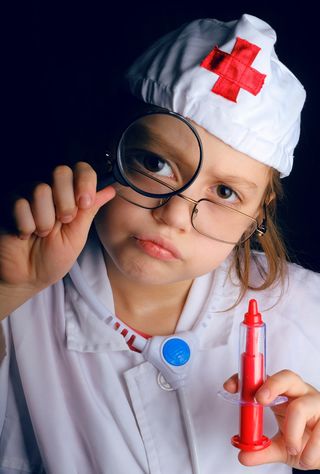Transgender
The American College of Pediatricians Is an Anti-LGBT Group
A small but clever anti-LGBT group created a legit-sounding name.
Posted May 8, 2017 Reviewed by Abigail Fagan

Did you read this headline and think I was accusing The American Academy of Pediatrics (AAP) of opposing the LGBT community? That’s the problem. A small anti-LGBT group called the “American College of Pediatricians (ACP)” created a name that is easily confused with the AAP, the largest pediatrics organization in the country.
It is disturbing that news organizations and physicians are citing the "ACP" as a reputable source. The ACP is a small group of physicians that left the AAP after the AAP released a 2002 policy statement explaining that gay parents pose no risk to adopted children. The Southern Poverty Law Center has repeatedly labeled the ACP as an anti-LGBT hate group that promotes false claims and misleading scientific reports.
Chillingly, the group has moved beyond its online reports, deeper into the political arena. They have gone as far as filing amicus briefs to U.S. courts for major cases concerning LGBT rights. Their reports have gained traction, despite clear criticism from expert physicians in the field. When asked about the ACP, Dr. Scott Leibowitz, medical director of the THRIVE program at Nationwide Children's Hospital and chair of the sexual orientation and gender identity issues committee for the American Academy of Child & Adolescent Psychiatry, did not parse his words, "It can hardly be a credible medical organization when it consistently chooses to ignore science and the growing evidence base that clearly demonstrates the benefits of affirmative care with LGBT youth across all ages."
Below are a few false statements propagated by the ACP that have the potential to harm LGBT youth:
1. Reparative Therapy for Homosexual Youth Is a Good Idea
Reparative therapy refers to an attempt to change an individual’s sexual orientation (generally from homosexual to heterosexual). In 2010, the ACP sent a letter to 14,000 school district superintendents promoting reparative therapy for gay and lesbian students. In the letter, they incorrectly cite NIH director Francis Collins, M.D., Ph.D., who swiftly denounced their letter as misleading and dangerous.
The American Academy of Pediatrics, The American Academy of Child & Adolescent Psychiatry, and The American Psychiatric Association, among others, have labeled reparative therapy dangerous and unethical. Reparative therapy has been repeatedly shown to be ineffective at changing sexual orientation, and non-acceptance of a youth’s sexual orientation dramatically increases the risk of suicide, depression, and substance abuse.
2. Gay Parents Are Bad Parents
This was the reason for the ACP's original formation. The American Academy of Pediatrics explained in 2002, citing a range of literature, that children of gay and lesbian parents have the same potential for health, adjustment, and development as children whose parents are heterosexual. In response, the ACP ignored key literature and issued a non-peer-reviewed report under its new legitimate-sounding name: “The American College of Pediatricians.”
The ACP seems to be the only group of physicians holding this stance, with the American Academy of Child & Adolescent Psychiatry, The American Academy of Pediatrics, and The American Medical Association, among others, vehemently disagreeing. The American Psychological Association dispels false claims on the topic by the ACP here for those who are interested in learning more.
3. Affirming Transgender Youth Is a Bad Idea
Perhaps the most popular falsehood1,2 publicized by the ACP recently is that transgender youth who are supported in their transgender identities are caused harm by this affirmation. Again, they ignore major studies. In the journal Pediatrics in 2014, researchers showed that pubertal blockade and cross-sex hormones resulted in improved mental health for transgender youth.
In 2016 and 2017, two papers showed that transgender children who are supported in their identities and allowed to socially transition have developmentally normal rates of anxiety, depression, and self-worth. Furthermore, transgender individuals whose families do not support their transgender identities are 20 percent more likely to attempt suicide.
I urge news organizations and individuals to stop propagating these false claims from the ACP. The health of LGBT youth depends on it.
Footnotes (and examples of how the ACP misleads readers and policymakers):
1 The ACP, in this report, claims that 97.8 percent of prepubescent transgender children change their minds about being transgender after they hit puberty. This is based on a study from 1987, and researchers explain here why such studies are flawed (the gist is that the kids in that study and others were never transgender to begin with). Furthermore, pre-pubertal children do not receive hormonal interventions under Endocrine Society Guidelines. Only adolescents who have reached puberty do, and all existing literature suggests that transgender identity is stable after youth hit puberty for the vast majority of these youth (Cohen-Kettenis 2003, deVries 2014).
2 The ACP claims that hormonal interventions make it impossible for transgender individuals to have biological children. This is false. Transgender teens receiving hormonal interventions are offered fertility preservation measures as explained in Endocrine Society Guidelines and detailed here.
Jack Turban's writing on neuroscience and children's mental health has appeared in The New York Times, The Journal of the American Academy of Child & Adolescent Psychiatry, and Kevin MD among others. Follow him on Twitter or online.
References
Adelson, S. L., & of Child, T. A. A. (2012). Practice parameter on gay, lesbian, or bisexual sexual orientation, gender nonconformity, and gender discordance in children and adolescents. Journal of the American Academy of Child & Adolescent Psychiatry, 51(9), 957-974.
Cohen-Kettenis, P. T., & Pfäfflin, F. (2003). Transgenderism and intersexuality in childhood and adolescence: Making choices (Vol. 46). Sage.
De Vries, A. L., McGuire, J. K., Steensma, T. D., Wagenaar, E. C., Doreleijers, T. A., & Cohen-Kettenis, P. T. (2014). Young adult psychological outcome after puberty suppression and gender reassignment. Pediatrics, 134(4), 696-704.
Durwood, L., McLaughlin, K. A., & Olson, K. R. (2017). Mental health and self-worth in socially transitioned transgender youth. Journal of the American Academy of Child & Adolescent Psychiatry, 56(2), 116-123.
Olson, K. R. (2016). Prepubescent transgender children: what we do and do not know. Journal of the American Academy of Child & Adolescent Psychiatry, 55(3), 155-156.
Olson, K. R., Durwood, L., DeMeules, M., & McLaughlin, K. A. (2016). Mental health of transgender children who are supported in their identities, Pediatrics, 137, 1-8.
Hembree, W. C., Cohen-Kettenis, P., Delemarre-van de Waal, H. A., Gooren, L. J., Meyer III, W. J., Spack, N. P., ... & Montori, V. M. (2009). Endocrine treatment of transsexual persons: an Endocrine Society clinical practice guideline. The Journal of Clinical Endocrinology & Metabolism, 94(9), 3132-3154.




